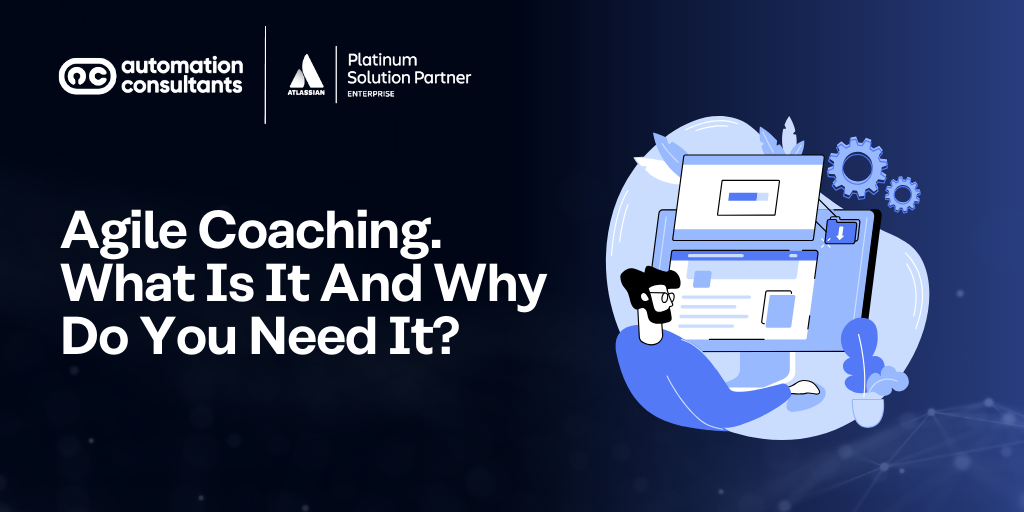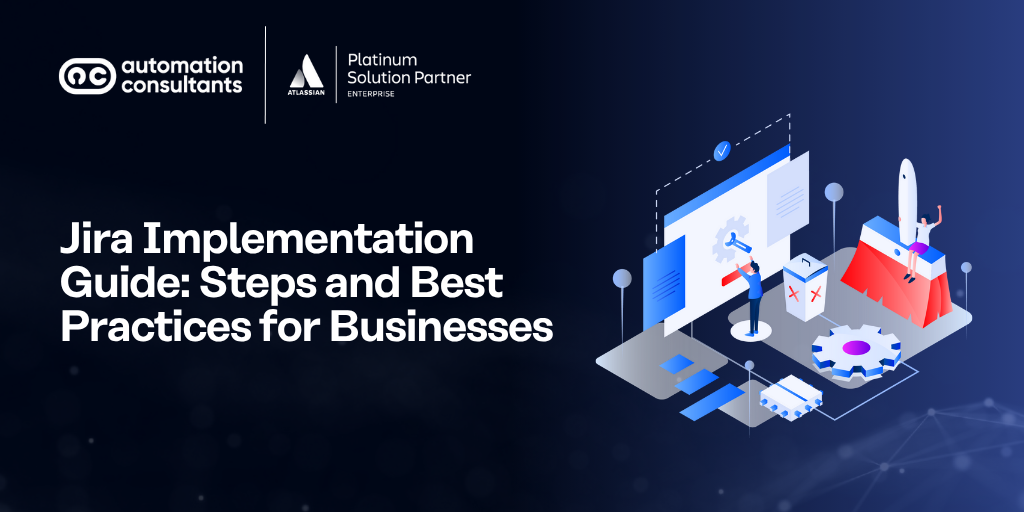Agile coaching is when someone—usually an external individual—supports your team or organisation in addressing the challenges that prevent them from being fully Agile.
Research has shown that 90% of companies fail at organisation-wide Agile transformations, so it’s no wonder the popularity of Agile coaches is on the rise.
So, if you’re reading this, and you also face Agile blockers — whether that’s down to your Agile maturity, implementation challenges, a lack of trust between leadership and people on the ground, choosing the right Agile at Scale framework, or teams working in silos — now might be the ideal time to find out how Agile coaching could help you.
How would you define an Agile coach?
Let’s start with a closer look at the role an Agile coach would take if they came into your organisation.
What is an Agile coach?
An Agile coach is a person who has experience in Agile practices, delivery, frameworks and ways of working.
Their role is to help you understand where you currently are in your Agile maturity, where you need to be, and what the roadmap to help you get there looks like.
These Agile team facilitators should work closely with you to help you find solutions to address your Agile challenges. Crucially, they’re not doing the work for you. Agile coaching isn’t about providing you with the answers.
Instead, a skilled coach should equip you with the knowledge and mindset of Agile to find the solutions to barriers yourself. They can mentor you towards developing the ‘right’ patterns and habits. They’ll ensure that you have an overarching understanding of what the Agile principles look like. And they will support your entire organisation in embedding trust and transparency within your working practices as you adopt Agile values.
In short, coaching is not only about adopting agile practices. Agile coaches often also help create a stronger, more adaptable work environment for long-term success.
How would Agile coaching help a project manager to implement a better Agile mindset and Scrum framework?
Agile coaching helps Project Managers be the best possible Servant Leaders and ensure their team’s value is maximised.
(If you’re unfamiliar with Agile terminology, you’d be wondering what on earth a Servant Leader is. We’ll explain.)
Scrum, the most common Agile framework, centres on three roles: Scrum Master, Product Owner, and Development (or Delivery) Team.
The Scrum Master role is closest to the traditional Project Management role and is described as a ‘Servant Leader’. They ensure their team has the right environment and tools to focus on their work and be accountable for it.
As a Servant Leader, the Scrum Master (or SM) also monitors any impediments or blockers, so their team can achieve the work they committed to.
What types of Agile coaches are there?
We commonly group Agile coaching into three categories.
Standalone coaching sessions
The first is where an enterprise Agile coach might be called in to deliver specific training at the team level through seminars or workshops.
Generally, these standalone sessions are not intended to embed long-term change or improvement. However, if your organisation already has a good level of Agile maturity and just a handful of areas where you need more support, one-off coaching can help teams by raising awareness and upskilling existing Agile champions.
Ongoing support
Another coaching type—and the kind we find delivers the greatest impact—is where the coach works closely with a team, coaching and mentoring during a project or period.
These coaches jump on calls, hold one-to-ones, deliver workshops and training sessions, and provide team members with a medium to long-term supporting role in implementing Agile culture.
High-level guidance
The third kind of coach takes more of a senior advisory role at the enterprise level.
This person has extensive experience with Agile leadership and often offers counsel to senior management. They provide high-level guidance to support stakeholders through their organisational Agile transformation journey – as opposed to being on the ground with the team.
At Automation Consultants, we offer an agile consultancy service tailored to your organisation’s needs.
Ultimately, all coaches – in any discipline – should bring a combination of practical experience, which ensures effective application in real-world scenarios, alongside validated knowledge. In the context of Agile coaching, this would look like Agile certification, like Scrum and SAFe, for example.
Unsure where you are on your Agile maturity journey? Take the Agile maturity assessment to evaluate your strengths and weaknesses across everything from People and Strategy to Culture and Operations. Based on the results, we can then help guide your teams towards higher Agile effectiveness and create environments that foster innovation, adaptability and productivity.
When would you need an agile coaching or consultation?
Lots of you reading this may have already introduced Agile into your teams.
You might also, however, have concerns that it hasn’t been truly embedded from the top down. As a result, you’re probably finding that getting things done effectively is hard work.
Do any of the below pain points sound familiar?
Progress is slow
Perhaps your digital transformation efforts are struggling to get off the ground, or projects like upgrading systems are coming up against barriers and running out of steam.
Some teams show a strong desire for improvement, initially enthusiastically embracing new ideas. However, they can often become overwhelmed by the workload or take on projects that begin energetically but stall swiftly. Others might be resistant to change.
If outcomes always seem out of reach and progress is painful, it sounds like your organisation isn’t benefiting from working in an Agile way. This is where additional support from a coach can help organisations with successful Agile adoption.
External pressures
Are competitors outpacing you? Are market demands evolving faster than your team can adapt, leaving you struggling to meet customer expectations?
Another challenge could be if your industry or sector is subject to regulatory changes. Your current processes may not be equipped to handle new requirements swiftly.
These scenarios demonstrate a lack of agility in responding to changes. An Agile coach can steer your team towards more adaptable and efficient practices.
Disconnect between leadership and ground-level
Sometimes, we talk to the people delivering code or product in an organisation and learn that they feel disconnected from the organisation’s top-level strategy.
Issues in team dynamics can also arise when management find themselves uncomfortable with a lack of transparency. The senior team can become anxious without visibility of work, while teams on the ground report micro-management or meddling from above.
This is a bit of a chicken-and-egg situation. Without a high level of Agile maturity throughout the organisation, you are unlikely to have transparent working processes and a trusting culture. But you need those strong foundations of trust, visibility, and accountability to truly embed Agile in the first place.
An experienced Agile coach can help to guide you through this balance, especially in the context of software development, where collaboration and transparency are crucial for success.
Teams being siloed
Often, when Agile methodology is not well-embedded at an enterprise-wide level, teams may work well themselves but not between different departments and business areas.
An ‘us and them’ mindset can quickly spring up.
Agile coaching should equip you with the confidence, skills and outlook to establish collaborative working practices and a trusting, transparent environment.
Lack of psychological safety
People do not feel comfortable talking about uncomfortable things in general work and life. Combine this with a fear of failure or admitting mistakes, and you’ve got the perfect anti-Agile environment!
For your Agile transformation to succeed, you must embrace the concept of ‘failing fast’. Rather than contributing to a blame culture, mistakes should be seen as valuable learning opportunities.
Again, coaching can help you to embed a cultural shift and to encourage longer term success.
Failure is inevitable. Every team is going to make mistakes on every project. So, thinking with your Agile hat on, you might as well fail as quickly as you can. The key is to break tasks down. Instead of building a 100-storey building all at once, tackle one storey at a time. See what works at each level; break things, and figure out how to solve them. You can only learn from these experiences. A key blocker to this can be the mindset of your senior management. They may not understand the concept of trusting their people and giving them the freedom to fail and experiment. This contributes to a team feeling monitored, and they may begin to hold back from sharing when things don’t go as planned, or from challenging the status quo. This, in turn, impedes progress, learning and innovation. A coach can help you to find ways to recalibrate and overturn this mindset, from the top down.
Hassan Khadra, Agile Project Manager at Automation Consultants
What is the value of Agile coaching?
Agile coaches will help your business to maximise the value of its limited resources, time and budget.
This translates into an improvement in profitability, customer satisfaction and market adaptability.
Every company has constraints, so it’s essential to embed processes that stretch these limits as effectively as possible to deliver a value outcome. Implementing—and truly embedding—Agile can help with this.
An Agile coach can strengthen your organisation’s PDCA (Plan, Do, Check, Adapt) cycle for continuous improvement.
As we mentioned earlier, you learn only from experimenting and trying things. Agile works by approaching work in small bits so that you learn from each one. This means you can apply increased knowledge and do better next time.
Such an iterative approach is also valuable because, inevitably, priorities shift. What you thought was a high priority on day one may have changed by day two, whether due to competitive forces, market needs, resourcing issues or a host of other fast-changing factors.
PDCA is the essence of every Agile framework, and an Agile coach will provide the guidance you need to truly benefit from it. With this support, you can underpin every activity and project your organisation embarks on with this cycle.
Ready to transform your team’s agility and outpace the competition? Don’t let challenges hold you back. Book a consultation with us today and unlock the full potential of your organisation. Embrace change, drive innovation, and achieve lasting success.
Our expert Agile coaches are here to guide you through every step of your Agile journey. Book your free consultation here to learn how we can support you.
Is it time for you to welcome Agile Coaching?
If some of the challenges we’ve touched upon in this piece ring true, then your team or organisation may benefit from the guidance of an Agile coach.
With our own dedicated Agile coaching services, we’d welcome the opportunity to learn about your blockers and objectives, and to share how we could help you.





